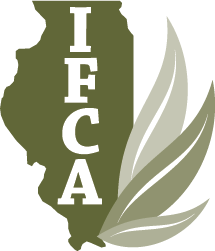Dicamba Stewardship
This week, Doug Owens, Bureau Chief of Environmental Programs at IL Dept of Ag, provided an interview with Brownfield Network, discussing the June 30 dicamba application cut-off date. Click here to listen to the interview.
IFCA, IDA and Illinois Farm Bureau were among the organizations that worked in partnership with the dicamba registrants (Bayer, BASF, Corteva and Syngenta) to amend the dicamba labels in Illinois, to specify a cut-off date and protections for sensitive areas. Everyone recognizes that the late planting season is not welcome for many reasons and the cut-off date will challenge weed management plans. The reasons for the cut-off were to ensure early season use of dicamba to reduce impact on sensitive crops and areas--not just sensitive soybeans, but other specialty crops such as orchards and also residential areas and trees.
The proactive move to establish a cut-off date was also instrumental in helping avoid the issue of dicamba and other pesticide uses being debated by the Illinois legislature, with suggestions on restrictions that would likely be much more onerous than a June 30 cut-off date. With Illinois leading all states with the number of dicamba misuse complaints filed in 2018, it is imperative to bring down the number of complaints to assure the long-term use of dicamba not just in soybean, but also in corn, as a burn-down and other labeled uses. Bottom line, dicamba is an emotional issue among farmers and also the general citizenry of Illinois. Because the ag industry enacted the special label in Illinois, we received public support for this effort from the environmental groups--the same groups that also continue to work collaboratively with us on nutrient issues because we are being proactive and working to police ourselves.
As we all know, the challenges we face at the Illinois state legislature, on many issues, requires us to be extremely proactive and to chart a course that assures our overall freedom to operate and to maintain public trust in pesticide and nutrient use. This is no easy task--we wish it were, but it just isn't in such a populous, urban-oriented state. It is often not clear why the cut-off was established for Illinois, but these are just some of the reasons, and we working hard to assure this chemistry remains a tool for agriculture, given the precedent setting number of complaints and concerns from those both within and outside of agriculture.
Dr. Aaron Hager offered suggestions for spring weed management in a wet season in a May 17, 2019 UI Bulletin: http://bulletin.ipm.illinois.edu/?p=4609 He also published a bulletin on May 6, 2019 specific to managing dicamba in a late-planting season: http://bulletin.ipm.illinois.edu/?p=4589
IFCA and our Board of Directors always welcomes input from our members. We evaluated many options, pros and cons, and the short and long-term impacts for our industry in making the decision to support the dicamba cut-off date, knowing also that our members are creative and flexible in providing crop protection solutions for our customers.
